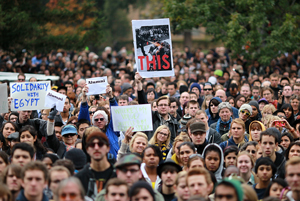On Tuesday, an Alameda County judge granted a UC campus police officers’ union request for a restraining order concerning the release of the university's report on the campus pepper-spray incident last November. The judge ruled that union attorneys should be able to read the report before it's released to the public.

Last November, UC Davis campus police doused a group of student protesters with the spray. Student and public outrage ensued, and the university assigned a task force to investigate the incident . The group was scheduled to release its findings yesterday afternoon, but it postponed at the last minute after learning of the request for a restraining order by the officers’ union.
The judge ordered the task force to give its report to the officers’ attorneys so they could determine which parts, if any, contain information about accused officers that might violate legal protections for police.
Steve Montiel, a UC spokesperson, said the university was disappointed with the judge’s decision. “We feel it’s important for this report to be made accessible to the UC Davis community and the public. It’s important so that the healing can begin and so the university can move forward.”
At issue are privacy protections afforded law enforcement officers. Police union attorney John Bakhit said the law prohibits public dissemination of information about officers’ personnel histories. He referred to section 832.7 of the California Penal Code, which says officer personnel records are confidential and shall not be disclosed in any criminal or civil proceeding.